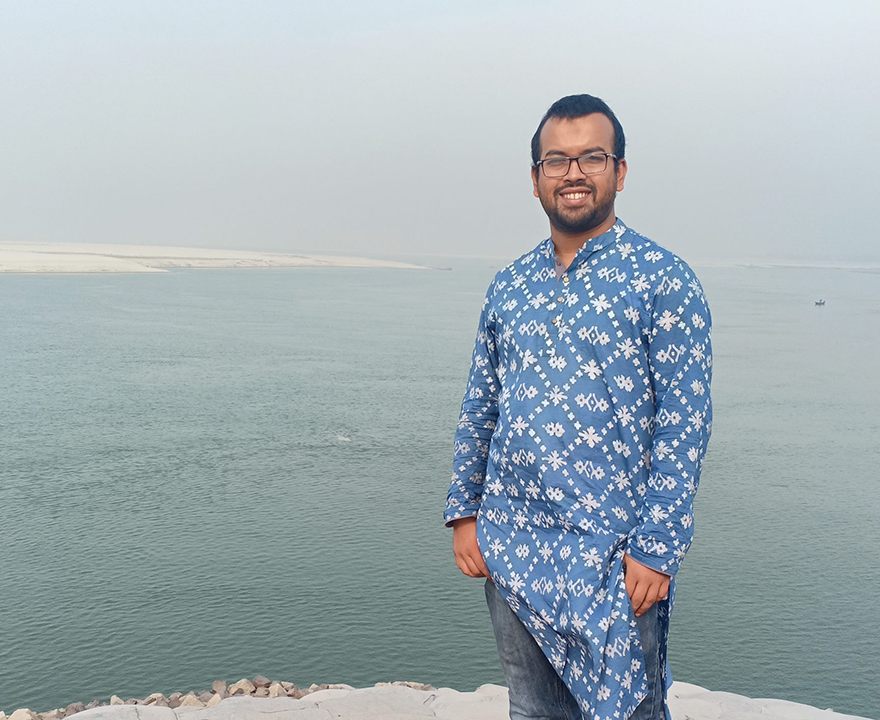Unveiling repression in Bangladesh

Unveiling repression in Bangladesh
- November 8, 2023
- Haunted by the increasingly authoritarian practices in his home country of Bangladesh, UCI anthropology graduate student Muhammad Raqib brings the stories of a deepening political repression to light
In 2013, Muhammad Raqib was an undergraduate student at the University of Dhaka in Bangladesh. He had no intention of pursuing research or a Ph.D. He was majoring in gender studies and planned on getting a “good” government job that would allow him to support his family.
But when Raqib returned home during a break from university in 2013, he became aware that people from his local area were being targeted with large-scale police violence and legal charges. He struggled to grasp the persecution he witnessed. When he returned to the University of Dhaka, he felt “haunted.”
A new path
Raqib searched for answers by reading books and articles and by joining study groups to discuss the political scenario. He became increasingly aware of how the ruling political party in Bangladesh exploited the under-resourced security agencies and judicial system to serve its political agenda.
“The study circles at Dhaka motivated me to work for people who don’t have someone to speak on their behalf,” he says.
In recent years, approximately 3 million political rivals advocating for voting and civil rights in Bangladesh have faced an increasing number of vague, evidence-poor legal charges. Targeting isn’t limited to activists but extends to their friends and family as well. Simply being from a particular neighborhood can leave people susceptible to prosecution. In a country of nearly 180 million people, there are only 1,800 judges, which means there are literally millions of citizens awaiting trials.
As Raqib approached the end of his undergraduate degree, he questioned his values and future. This introspection broadened the scope of his goals and the path his life would take.
“Will I support my family, or could I do something that could also benefit my whole community? This is when my interest shifted from becoming a good government employee to someone whose work and research might impact and shape national and judicial policies,” he says.
Crossing continents
Raqib was born and raised in Feni, a mostly working-class district in the southern part of Bangladesh. He is the first and only person in his family to attend college.
“My presence at university was highly securitized. I’m from a background that is highly surveilled. If you’re not from a trans-modern, trans-elite aspirationally Bengali nationalist, you could be subject to police violence anytime,” he says.
After obtaining his undergraduate degree, Raqib attended the School of Oriental and African Studies (SOAS) University of London where he received a master’s degree in anthropology and human rights.
“It was only through anthropology that I could grasp these issues on a deeper level,” he says.
Raqib's mentors in Dhaka encouraged him to pursue an international degree to extend the reach of his research, and the expertise of the anthropology department faculty ultimately drew him to UCI.
Generosity
Today, Raqib is a third-year graduate student who has advanced to candidacy in the anthropology department in the UCI School of Social Sciences. He moved to Irvine with his wife and children. His kids have made good friends in school and his family are active members in their local church.
Around campus, Raqib has impressed the faculty with his diligence and intelligence. Distinguished Professor George Marcus had the pleasure of teaching Raqib in a seminar during the 2021-22 academic year and described him as a standout student.
According to Marcus, “He is a committed student of exceptional ability.”
Distinguished Professor David Theo Goldberg came to know Raqib well when he served as a TA for Goldberg's undergraduate course in critical race theory.
“If he doesn’t know something he’ll pursue it. He seeks out colleagues both at UCI and more broadly. He has the disposition of someone who is likely to become a very good academic as his career proceeds,” Goldberg says.
Impact
Raqib’s research focuses on the security regime and legal practices in Bangladesh. More specifically, he examines how socio-economically marginalized low income people are navigating the legal terrain during this period of political repression. Since it is typically men who are being prosecuted, it’s often their wives who are navigating the court system without prior knowledge and little to no resources.
“There hasn’t been a lot of attention paid to how the impact of the global security apparatus extends to these smaller, less powerful states,” says Goldberg.
The majority of Raqib’s interviewees have been targeted by the state and live in fear. To avoid causing further trauma, he pursues interviews cautiously. Those who feel safe and are willing to share their story often lack faith in the media and turn to Raqib with the hopes that his writing and research will shed light on the political scenario in Bangladesh.
“As a Ph.D. student, they hope that my documentation will draw attention to their plight and persecution,” he says.
Raqib expects to complete his degree in 2026 and hopes to secure an academic position where he can continue to collaborate with students and colleagues.
“With an academic position,” he says, “I hope I can make a positive impact on society and benefit my community.”
-Jill Kato for UCI Social Sciences
Would you like to get more involved with the social sciences? Email us at communications@socsci.uci.edu to connect.
Share on:




connect with us